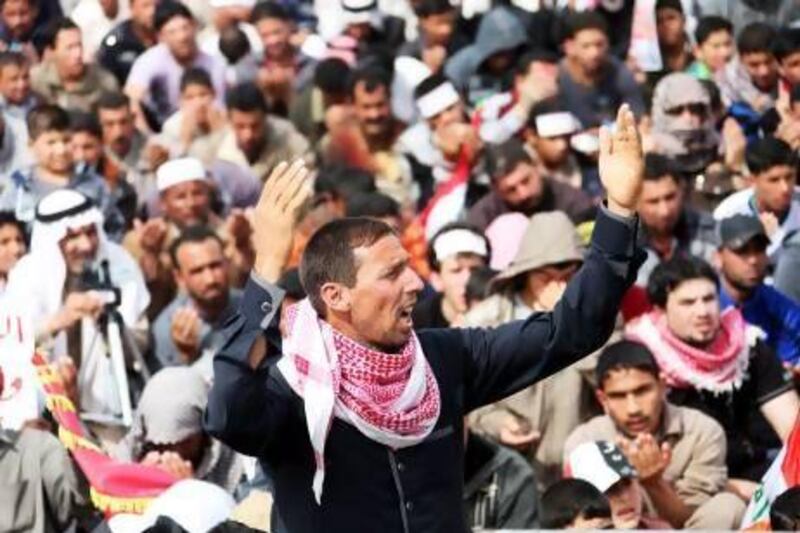FALLUJAH // Iraq's embattled finance minister resigned yesterday in front of tens of thousands of Sunni protesters in Anbar province.
The resignation of Rafi Al Essawi, a Sunni, was the latest sign that Iraqi politics may be becoming even more precarious, with Sunni leaders losing the support of the country's embittered Sunni population.
"I am with you, I am your son and I announce today … that I am presenting my resignation from the Iraqi government," he told the crowd gathered for Friday prayers and protests in Ramadi.
The state-backed Iraqiya TV quoted the office of the prime minister, Nouri Al Maliki, as saying he would not accept Mr Al Essawi's resignation until investigations into his "financial and administrative violations" were complete, without providing any details.
Protests in Sunni areas have become huge weekly events since the December arrest of Mr Al Essawi's bodyguards.
They were arrested on charges of terrorism.
Sectarian tension has also been exacerbated by regular bombings that appear to target mostly Shiite-majority areas, although Sunni protesters disavow such attacks.
At least eight people were killed in bombings yesterday, and more than 20 the day before. Local Sunni leaders say the feeling that their sect has been discriminated against by the Shiite-dominated government has persisted so long that action is inevitable.
The demonstrators have been hard on Sunni legislators, whom they accuse of having failed to make a difference in parliament.
Protesters say Sunnis are still not being recruited in security forces, and claim unlawful detention of thousands of people continues along with poverty.
It was after protesters at one such rally yesterday called angrily for him to step down that Mr Al Essawi made the announcement, witnesses say.
His political position had become increasingly difficult since nine of his bodyguards were arrested.
Mr Al Essawi was the latest in a string of Sunni politicians to come under suspicion from security forces.
Vice president Tareq Al Hashemi fled the country after he was accused of murder in 2011. He was later sentenced to death and remains exiled in Turkey.
Salah Al Mutlaq, a deputy prime minister critical of Mr Al Maliki, sparked a political crisis in 2011 when he called the prime minister a dictator on television and tanks surrounded his house shortly afterwards. He fled to Jordan, although he has since returned.
The mostly Sunni Iraqiya political grouping has complained that promises made to it by Mr Al Maliki have not been kept, but those who voted for the bloc have still been criticised for not doing enough.
In the face of such criticism, said Jaber Al Jaberi, a Sunni parliamentarian close to Mr Al Essawi, the finance ministry became untenable.
"Day after day, people protest because of him, and they attack his house and his office, and if he stays with this government there is no dignity," Mr Al Jaberi says.
Mr Al Essawi is likely to stay in the country, he added, and will join the protesters until their demands are met.
Despite the calls for the government's fall by many at the peaceful rallies in the western province, which was a hotbed of anti-American fighters during the worst of the country's war, Mr Al Jaberi said the demonstrations were intended to achieve reforms of the existing government.
"We ask for our rights," he said. "We don't care who the prime minister is, because we know the prime minister will come from the Shia bloc, but … there is complete marginalisation of the Sunni community in all the ministries and we ask to release the innocent people in the prisons."





